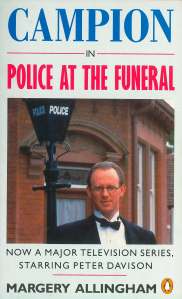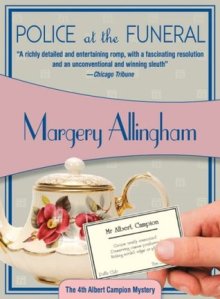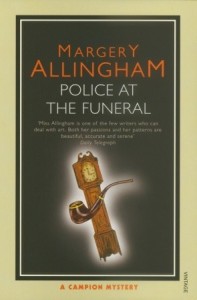 This is the book that many see as being the breakthrough for Margery Allingham in her series featuring Albert Campion, who after three comparatively ‘light’ adventures finally appeared in a darker, more substantial work that showed something like the true potential of its young author. Does this view of it stand up after 85 years? Well, two of my blogging buddies, Neeru and Santosh, both felt let down, bemoaning a conclusion that showed unacceptable evidence of racial bias that pretty much wrecked their enjoyment of the story. So I thought I’d give it another look …
This is the book that many see as being the breakthrough for Margery Allingham in her series featuring Albert Campion, who after three comparatively ‘light’ adventures finally appeared in a darker, more substantial work that showed something like the true potential of its young author. Does this view of it stand up after 85 years? Well, two of my blogging buddies, Neeru and Santosh, both felt let down, bemoaning a conclusion that showed unacceptable evidence of racial bias that pretty much wrecked their enjoyment of the story. So I thought I’d give it another look …
I submit this review for Bev’s Golden Age Vintage Mystery Scavenger Hunt; and Todd Mason’s Tuesday’s Overlooked Movie meme at his fab Sweet Freedom blog.
“Am I a serious practitioner or someone playing the fool?”
The book concerns the venerable Faraday family of Cambridge that is so steeped in the past that they still go to church on Sundays in a horse-drawn carriage even though we are in the early 1930s. Ruling the roost is Caroline Faraday, a powerful remnant of Victorian society who dominates the rest of the clan, made up of Andrew (who has gone missing and is feared dead), the pompous William, the indolent and overweight Julia, the hysterical Kitty and the black sheep of the family, Uncle George. All of them behave like children, constantly squabbling, and are barely held in check by Caroline, who holds the purse strings. The one bright spark in the household is Joyce, Kitty’s niece by marriage, who is due to leave soon when she marries Marcus, the family solicitor, and an old friend of Campion’s. Initially called in to find Andrew, who disappeared shortly after rowing with William, who can’t account for his movements at the time (he claims to suffer from bouts of amnesia), Julia is soon found poisoned in her room, having drunk from a cup of tea brought to her by Kitty. Then William is attacked with a blade (though he claims it was only a cat) before George arrives to assert his rights over the family, leading to another death and the revelation of a surprise villain.
“I’m sorry about Uncle William,” murmured Mr Campion. “You haven’t seen him at his best.”
 This is a pretty good whodunit (I didn’t guess the identity of the killer the first time round, though Allingham doesn’t exactly play fair when it comes to clues), though it is the depiction of the Faradays that impresses. There is a Poe-like gloom that hangs over Socrates Close and the book conveys well a sense of decay and instability about the final dregs of a long family line seemingly weakened by a lack of new genetic material (shall we say). And this is where we get to the sticking point – in the penultimate chapter (mild spoiler alert), we learn that the reason why Uncle George was out of favour was that he was a ‘blackamoor’ – a half-caste, though this is not gone into in any detail. When I first read this I didn’t find the plot detail particularly offensive, partly because Julia, the one family member we truly like, sees this as not a relevant issue while Campion, when told of this, fights back the urge to comment, while instead imagining that this could have been a scandal, but only some sixty years before. On the other hand, when aligned with the sense that the Faradays are crumbling at a genetic level (one imagines that by now they must have what you might call, ahem, a rather narrow family tree), one can find this detail unpleasant. One imagines that Allingham was probably thinking of the secret from Jane Eyre as an inspiration, but I certainly wish that the detail were different. Having said that, and I don’t mean to let the author entirely off the hook here (as she never condemns the position either), though at least she does make it clear that such views belong to an antiquated past that is long gone. And it is interesting to note that this element was completely eliminated in the otherwise surprisingly faithful TV version …
This is a pretty good whodunit (I didn’t guess the identity of the killer the first time round, though Allingham doesn’t exactly play fair when it comes to clues), though it is the depiction of the Faradays that impresses. There is a Poe-like gloom that hangs over Socrates Close and the book conveys well a sense of decay and instability about the final dregs of a long family line seemingly weakened by a lack of new genetic material (shall we say). And this is where we get to the sticking point – in the penultimate chapter (mild spoiler alert), we learn that the reason why Uncle George was out of favour was that he was a ‘blackamoor’ – a half-caste, though this is not gone into in any detail. When I first read this I didn’t find the plot detail particularly offensive, partly because Julia, the one family member we truly like, sees this as not a relevant issue while Campion, when told of this, fights back the urge to comment, while instead imagining that this could have been a scandal, but only some sixty years before. On the other hand, when aligned with the sense that the Faradays are crumbling at a genetic level (one imagines that by now they must have what you might call, ahem, a rather narrow family tree), one can find this detail unpleasant. One imagines that Allingham was probably thinking of the secret from Jane Eyre as an inspiration, but I certainly wish that the detail were different. Having said that, and I don’t mean to let the author entirely off the hook here (as she never condemns the position either), though at least she does make it clear that such views belong to an antiquated past that is long gone. And it is interesting to note that this element was completely eliminated in the otherwise surprisingly faithful TV version …
“It”s queer,” he said guardedly. “I suppose this must be the last household in England of its kind?”
The girl shuddered. “I hope so,” she said.
Police at the Funeral / Campion (BBC TV, 1989)
Director: Ronald Wilson
Producer: Ken Riddington
Screenplay: Jeremy Paul
Cinematography: Ian Punter
Art Direction: Paul Munting
Music: Nigel Hess (theme tune sung by Peter Davison)
Cast: Peter Davison (campion), Brian Glover (Lugg), Andrew Burt (Oates), Mary Morris (Caroline Faraday), Timothy West (William Faraday), Suzanne Burden (Joyce Blount), John Harding (Marcus Featherstone)
 I think the always underrated Peter Davison was superb casting choice as the lead in Campion, a BBC show that as developed by John Hawksworth (who also developed the terrific version of Sherlock Homes starring Jeremy Brett) did a marvellous job of retaining Allingham’s air of gentle irony and fantasy. The show very smartly managed to undertake the frequent tonal shifts from whimsy to deadly earnest with a great deal of panache, and Davison is key to that, impressing both in his comedic timing and as a man of action and mystery, a really tough combonation to pull off. Timothy West is especially good in this two-part dramatisation of the novel as the bombastic and foolish Uncle William, though it is Mary Morris, in her final screen role, who truly stands out as Great Aunt Caroline Faraday. The novel is followed extremely closely and most of the dialogue is retained too – a few things are simplified and the whole section dealing with the inquest in Uncle Andrew’s death has been eliminated. Otherwise this is extremely true to novel – though, as I mentioned earlier, Uncle George’s ‘scandalous’ secret is now merely that he was illegitimate, nothing more – and which I certainly preferred.
I think the always underrated Peter Davison was superb casting choice as the lead in Campion, a BBC show that as developed by John Hawksworth (who also developed the terrific version of Sherlock Homes starring Jeremy Brett) did a marvellous job of retaining Allingham’s air of gentle irony and fantasy. The show very smartly managed to undertake the frequent tonal shifts from whimsy to deadly earnest with a great deal of panache, and Davison is key to that, impressing both in his comedic timing and as a man of action and mystery, a really tough combonation to pull off. Timothy West is especially good in this two-part dramatisation of the novel as the bombastic and foolish Uncle William, though it is Mary Morris, in her final screen role, who truly stands out as Great Aunt Caroline Faraday. The novel is followed extremely closely and most of the dialogue is retained too – a few things are simplified and the whole section dealing with the inquest in Uncle Andrew’s death has been eliminated. Otherwise this is extremely true to novel – though, as I mentioned earlier, Uncle George’s ‘scandalous’ secret is now merely that he was illegitimate, nothing more – and which I certainly preferred.
I submit this review for Bev’s 2016 Golden Age Vintage Mystery Scavenger Hunt in the ‘clock/timepiece’ category:



I agree, Sergio: Davison was great in the role of Campion. And it is always nice when an adaptation stays close to the novel. Of course, I admit to being a
cranky, fussy, impossible-to-pleasededicated purist. Still, I do like it when that happens. Interesting, too, that it took Allingham a few novels to find her stride. I suppose it’s that way with a lot of authors.I was glad that the racial aspect was excised – book holds up well otherwise
I gave Mystery Mile a go last month and wasn’t all that impressed, too much studied eccentricity for my taste. Having said that, I’m not prepared to give up on Allingham quite yet – perhaps somewhere like this is a better point of entry.
I think this is a much better book and she never looked back from then – anything from 1933 on is a very safe bet in my view ☺
As i said, I do plan to give her another try, and I’ll probably make the effort to read either this or one of the subsequent titles.
Death of a Ghost is a great place to start I reckon. I’ll lend you a couple of the TV versions if you like – just about to send you the first series of THE LAST DETECTIVE in fact 🙂
Ought to be something heading your way within the week too!
What a nice guy!
I have read the book and also seen the film.
I agree that the book holds up well if we exclude the racial aspect at the end. And this has been excised from the film.
The method of death of Andrew reminded me of a Sherlock Holmes story.
Thanks Santosh as I wouldn’t have re-read it if you hadn’t goaded me into it, and I’m very glad I did. And yes, most definitely a ‘homage’ to that classic Holmes story (which I shall refrain from mentioning to avoid spoilers)
With some authors, it’s their first few books I prefer: they are frequently based closely on their own lives and the times they live in and are full of gold for the social historian. Then they grow up, become successful, move to the Cotswolds and try to write “timeless classics”. (They also lose touch with the passing scene.) Allingham is not one of these. Her early books are enjoyable romps (Mystery Mile, Sweet Danger) with a dark side, but she got better and better. I put her later books on the same shelf as Dickens. For the “secret”, see also the film version of Enter Sir John (30s). We like to think that such attitudes belong in the past, but I remember adults in the 50s muttering about people of mixed origins.
Thanks for that Lucy, and I agree completely about her work – I wouldn’t trade TIGER INT HE SMOKE with almost anything from that decade(well, I’d have to keep a couple of Graham Greene books from the 50s). I’ve only seen the MURDER movie – is ENTER SIR JOHN the same in that regard?
The “secret” in Enter Sir John is different in the book and the film, but I can’t know remember which is which. (Have not read the book – waiting to find a cheaper copy!)
Mee too! Thank for that. In the film it is definitely racial – in the book i wonder if it was sexual?
I was commenting on someone’s blog recently about how much I love this one, and that I must re-read, especially in the light of the racism problem which had passed me by when I first read it. So am very glad to read your measured review, just what I need as a starting point.
Of course what I do remember is the fabulous sense of place, the characters that stick in the mind, the atmosphere of Caroline’s house. I was telling somebody that when I was first living in Cambridge, and looking about me, I would see those huge grey houses and think ‘that’s a Faraday house.’ I narrowed it down as to which one I thought was theirs…
Really? That’s terrific – I’m rubbish at sussing out real life equivalents to fiction (we;;, probably better if it’s Rome I suppose). Thanks Moira.
As this is the 50th anniversary of Allingham’s death, a fitting tribute would be if everyone tried (or revisited) her work for she really was one of the shining stars of the “Golden Age”, though perhaps Police at the Funeral is not the best starting point. Apart from there being no funeral and no policemen (!) it is saddled with a “McGuffin” that is, thank Goodness, unpalatable today. Margery’s early thrillers – Mystery Mile, Sweet Danger and especially Look To The Lady – are, I think, a delight and her affection for a good old pirate story shines through. When the late Harry Keating and I were asked by The Times to compile a list of “the 100 Best” crime novels of the 20th century, I opted for Look To the Lady whilst Harry chose Death of A Ghost. BOTH of us insisted on Tiger In The Smoke. Later this year, as part of the commemoration of her death, the Margery Allingham Society are arranging a showing of the 1956 film in the London church where several scenes were filmed.
Great news about the screening, that is a film that is not even remotely easy enough to find and I love it (even if Campion has been removed from it). I love the playful fantasy of the early ‘treasure hunt’ thrillers but agree, Tiger is the one you have to have! Please let me know about the screening!
I don’t think I have seen any of this series. Have to look around for the series.
The books are great but the TV show captured it extremely well in my view.
I agree – Peter Davison was brilliant. I wish he had read more of the books, but Francis Matthews made a great audio-Campion.
Never heard Matthews but yes, it was nice that Davison go to do some as it was clearly the plan that he do the later books with Lysette Anthony as Lady Fitton – ah, what could have been …
Great reviews. It’s years since I read this but I do agree that Davison was perfect as Campion – time to see if I can my old VHS copies to play!
Thanks for that Karen – oh, and just so you know, just got myself that penguin with the translation of War and Peace with all the French bits turned into English!
🙂 Glad to hear it! Enjoy!
Very much a book for the Summer – I reckon I start in late July I might be done by Christmas 🙂
I liked this one pretty well as I recollect, but certainly didn’t think it her best.
Thanks Curtis – I would certainly agree with that sentiment – I would always say start with Death of Ghost …
I’ll get back to Allingham at some point. Thanks for the prompt.
You really should chum – I am very biased but she was a very singular talent.
Sergio, I have not read Allingham. To be honest, racial aspects in novels (and films) don’t bother me so much, even though such portrayals often mirror reality. I read fiction and watch movies for fun and entertainment. I’m not very analytical about what I read or watch. In the end it’s only someone’s opinion, a figment of imagination, that I try not to lose sleep over. I feel differently about this issue in the real world.
Thanks Prashant – I love her work and this, I think, the only example where someone being of mixed race is used in a pejorative way, and specifically by someone who clearly belongs to the (then) previous century – I love her work in general, full of fun and great atmosphere.
“Poe-like gloom?” “Decay and instability?” Okay, okay, I’ll read it.
Hope you enjoy it Kelly 😆
I want to reread all her books but I started recently with Death of a Ghost and will move forward from there. I never seem to catch up with all the reading I want to do. We have only watched one of the Peter Davison series but I cannot remember which one. I think it was The Case of the Late Pig. I would like to see more of them.
Thanks Tracy. They are very good fun and happily recommend them to everybody (as uni may have noticed …) The books are marvellous and I happily re-read them whenever I get the chance but in fact have still got a couple unread (The China Governess is one of them)
I know I’m in the minority, but that show failed utterly with me. I can’t bear to watch it. It just makes me cringe. I can’t stand that Lugg character either in the book or the show. Having said that, I have read MORE WORK FOR THE UNDERTAKER and enjoyed it except for Lugg, but thankfully he doesn’t play a major part here if I’m remembering correctly. I also enjoyed Allingham’s BLACK PLUMES. (which doesn’t feature Campion at all. I really do wish I had a better memory, but details fade quickly these days. I just know I liked these two titles rather well. I had earlier read one other Allingham book and hated it. But thankfully, I didn’t let that deter me from trying a couple of others.
Shame that the Lugg character is such a major turn-off for you Yvette especially as he’s only a supporting character and there is so much to enjoy in the series 🙂
SPOILER ALERT
What I found most irksome was Joyce’s fainting at the sight of George in one of the initial chapters. WTH. Were horns sprouting out of his head? And Joyce is definitely not 19th Century, she is very much a twentieth century girl. So English Roses faint at the sight of somebody who is of mixed parentage?! Grow-Up plz.
But that is because he is a horrible person, surely?
No, it was because he had a Non-White parent. You don’t faint seeing a horrible person, you faint because you think that men with ‘Black’ blood in them have only one lustful agenda in mind when they see a white woman. The unstated implications in that fainting spell passage make me sick.
I disagree, I didn’t read any evidence of this at all in the text – in the book she makes it clear that she is not bothered about the stories of his background, but it is the behaviour.(and he more than lives up to THAT reputation).
There is a difference between one’s talk and one’s actions Sergio. Andrew is also a nasty piece of goods. Does the text mention that she ever fainted seeing him? If it was only a matter of ‘being horrible’ than she could have turned pale or anything but she faints. A man with mixed blood evokes such strong repulsion in her that she loses consciousness. I don’t see this description as innocent. Allingham is suggesting something over here.
But in the story it is made clear that she was shocked because she didn’t expect to see him as he had been absent for such a long time and she was upset about being secretly followed – the only character who expresses a racist view on him is the matriarch and both Campion and the author make it crystal clear that her position has no place in the 20th century. Why assume otherwise when we’re are told the opposite? Unlike Sayers there is nothing in her other books to suggest Allingham was a racist
Racial prejudices and discrimination persist even in the twenty-first century, what to talk about the twentieth? And is a character in a book always telling the truth about his/her feelings or actions? Part of the fun of reading a book is to see/guess how unreliable a particular character is. Why should we believe the reason that Joyce provides? It was such an extreme reaction. Very frankly, I am yet to come across another character who faints because the person s/he faces is horrible. Yes, horror is involved here but it is the horror of miscegenation.I have read too many accounts of brutal savage Black men to treat this as innocent.This is my reading of the situation and you do not read it in the same manner.
I have also not come across any other instance of racism in Allingham. But it was there in this and so I pointed it out. Usually I enjoy books and films without bothering too much about the overt/covert prejudices in them but sometimes I find them really offensive and it was the case with this book.
Anyway forget about all this and have a grand time with the family:)
OK